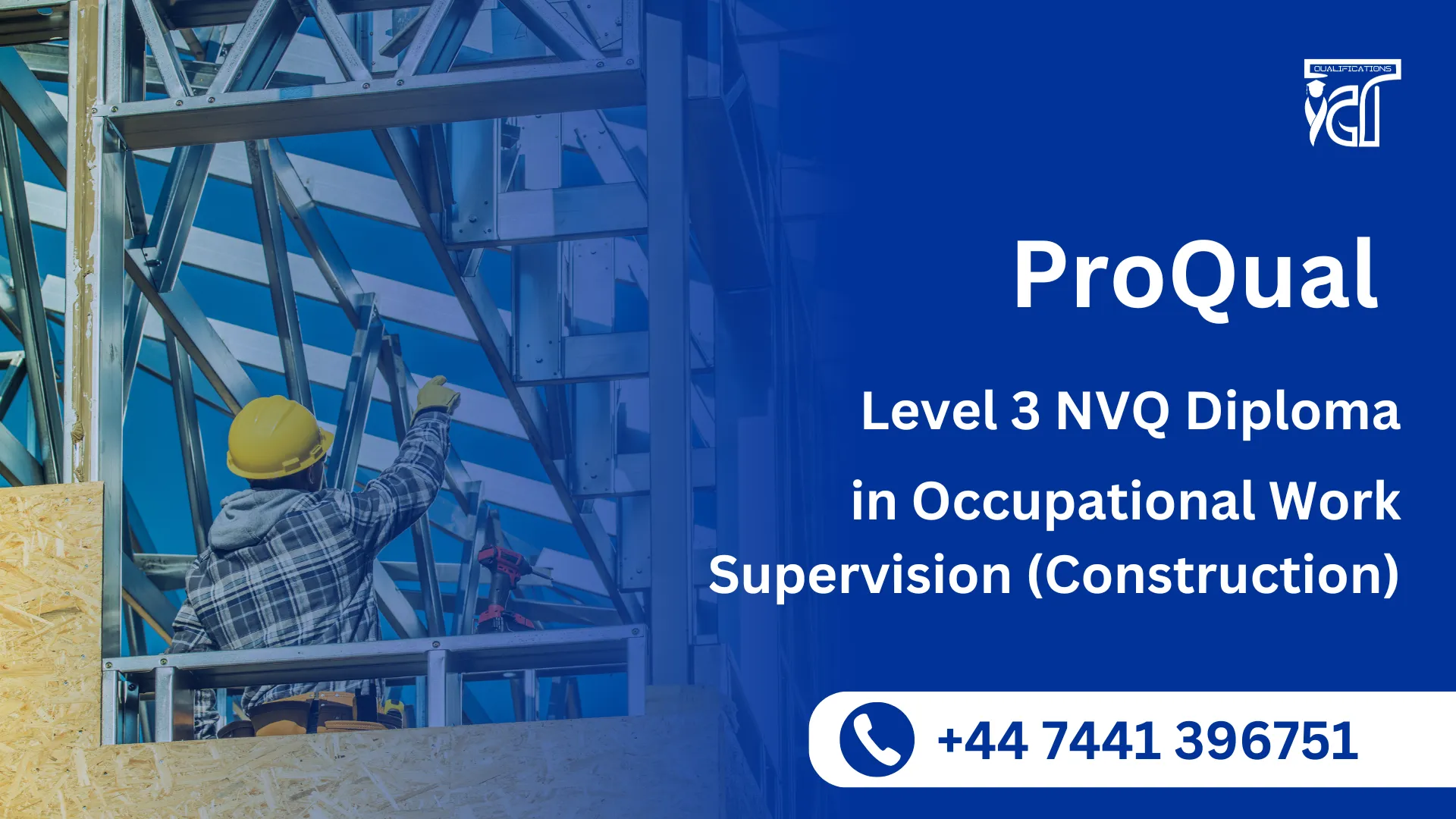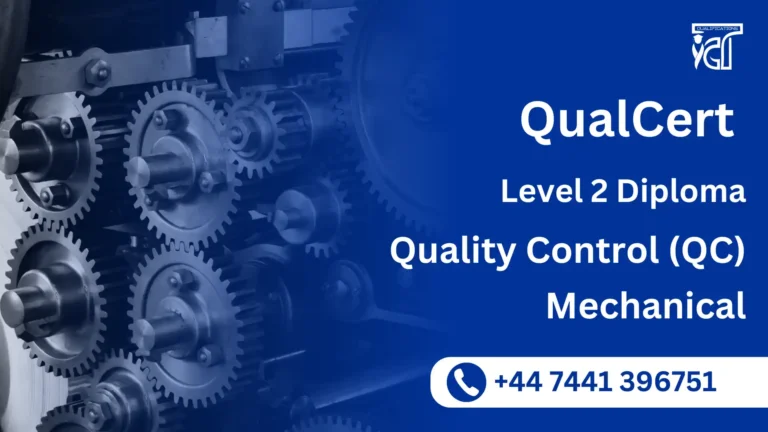The ProQual Level 3 NVQ Diploma in Occupational Work Supervision (Construction) is a key qualification for professionals in the construction industry aiming to develop their supervisory skills and advance their careers. As an Ofqual-regulated qualification, this diploma is nationally recognized and is ideal for those looking to formalize their experience and take the next step in their construction career.
The ProQual Level 3 NVQ Diploma in Occupational Work Supervision (Construction) is a qualification aimed at individuals who are already working in supervisory roles within the construction industry or those who aspire to do so. This Ofqual-regulated qualification allows learners to gain formal recognition for their expertise and skills in supervising construction projects, teams, and operations.
The course is entirely assignment-based, meaning that learners will apply their knowledge directly to their work environment. The practical nature of this qualification ensures that you will develop real-world skills that can be immediately implemented on-site.
The Level 3 NVQ Diploma in Occupational Work Supervision covers a range of essential skills and knowledge required to manage and supervise construction projects effectively. The qualification is suitable for individuals in supervisory roles who need to demonstrate their competence in supervising construction activities, managing teams, ensuring safety compliance, and overseeing operations on construction sites.
The ProQual Level 3 NVQ Diploma in Occupational Work Supervision (Construction) is an essential qualification for professionals in the construction industry looking to formalize their supervisory skills, enhance their career prospects, and take on more responsibility within their role. As an Ofqual-regulated qualification, it offers international recognition and is ideal for those seeking to move into senior supervisory or management positions. With practical, assignment-based learning and a focus on key areas like project management, health and safety, and leadership, this qualification will provide you with the expertise needed to excel in the construction industry.
ProQual Level 3 NVQ Diploma in Occupational Work Supervision (Construction)
The ProQual Level 3 NVQ Diploma in Occupational Work Supervision (Construction), To achieve the qualification candidates, complete ALL SIX of the Mandatory units, plus a minimum of TWO Optional units.
Mandatory Units
| Unit Title | Unit Level | GLH |
|---|---|---|
| Confirming Work Activities and Resources for an Occupational Work Area in the Workplace | 3 | 33 |
| Developing and Maintaining Good Occupational Working Relationships in the Workplace | 5 | 27 |
| Confirming the Occupational Method of Work in the Workplace | 3 | 37 |
| Implementing and Maintaining Health, Safety and Welfare in the Workplace | 3 | 37 |
| Co-ordinating and Organising Work Operations in the Workplace | 3 | 40 |
| Monitoring Progress of Work Against Schedules in the Workplace | 3 | 30 |
Optional Units – complete a minimum of TWO units
| Unit Title | Unit Level | GLH |
|---|---|---|
| Allocating and Monitoring the Use of Plant and Equipment in the Workplace | 3 | 30 |
| Confirming Work Meets Quality Standards in the Workplace | 3 | 30 |
| Implementing Procedures to Support the Team’s Performance in the Workplace | 3 | 37 |
| Co-ordinating and Confirming Dimensional Control of Requirements of the Work in the Workplace | 3 | 27 |
GLH (Guided Learning Hours) and TQT (Total Qualification Time) are terms commonly used in vocational qualifications to help define the amount of time a learner is expected to spend on their studies.
1. GLH (Guided Learning Hours)
GLH refers to the number of hours a learner spends being directly taught, supervised, or supported during their course. This includes the time spent in activities such as:
- Classroom instruction
- Practical workshops
- One-on-one tutoring or mentoring sessions
- Online learning sessions with tutor support
In other words, GLH represents the time that learners are actively engaged with their instructors or learning activities.
2. TQT (Total Qualification Time)
TQT represents the total amount of time a learner is expected to invest in completing a qualification, including:
- GLH (Guided Learning Hours): Time spent on direct learning, as explained above.
- Self-Directed Learning: This includes time spent on independent study, research, assignment completion, preparation for exams, and any other work the learner does outside of direct teaching hours.
TQT is a broader measure that includes all the time required to achieve the qualification. It helps learners and employers understand the overall commitment required for the qualification.
Key Differences Between GLH and TQT:
- GLH focuses on direct learning with guidance or supervision.
- TQT includes GLH as well as independent study time and other learning-related activities.
Example:
If a qualification has a TQT of 600 hours and a GLH of 250 hours, it means the learner should spend 250 hours in direct learning (classroom, online, or tutor-led sessions) and 350 hours on independent study or research.
ProQual Level 3 NVQ Diploma in Occupational Work Supervision (Construction)
Confirming Work Activities and Resources for an Occupational Work Area in the Workplace
- Identify work activities, assess required resources and plan the sequence of work.
- Obtain clarification and advice where the resources required are not available.
- Evaluate the work activities and the requirements of any significant external factors against the project requirements
- Identify work activities which influence each other and make the best use of their sources available.
- Identify changed circumstances that require alterations to the work programme and justify them to decision makers.
Developing and Maintaining Good Occupational Working Relationships in the Workplace
- Develop, maintain and encourage working relationships to promote good will and trust.
- Inform relevant people about work activities in an appropriate level of detail, with the appropriate level of urgency.
- Offer advice and help to relevant people about work activities and encourage questions/requests for clarification and comments.
- Clarify proposals with relevant people and discuss alternative suggestions.
- Resolve differences of opinion in ways that minimise offence and maintain goodwill, trust and respect.
Confirming the Occupational Method of Work in the Workplace
- Assess available project data accurately to determine the occupational method of work.
- Obtain additional information from alternative sources in cases where the available project data is insufficient.
- Identify work methods that will make best use of resources and meet project, statutory and contractual requirements.
- Confirm and communicate the selected work method to relevant personnel.
Implementing and Maintaining Health, Safety and Welfare in the Workplace
- Allocate and maintain health, safety and welfare equipment and resources to meet project and statutory requirements.
- Encourage a positive health, safety and welfare culture whilst identifying opportunities for improving the health and safety of the work environment.
- Ensure that their team is inducted and suitably competent and monitored whilst at the workplace.
- Monitor health, safety and welfare in the relevant work environment in accordance with statutory requirements.
Co-ordinating and Organising Work Operations in the Workplace
- Provide adequate information about the work, as required, to all people affected.
- Agree a programme and methods of work with the people who will carry out the work.
- Organise the work being done with other operations as required for the overall work being carried out.
- Obtain sufficient resources of the appropriate type to meet the project requirements and timescales.
- Organise and control the work and resources in order to keep the workplace safe and tidy
- Identify, record and pass on information on any special considerations to people who could be affected.
- Organise the work area layout for operational purposes and communicate to the people involved with the work.
- Organise the storage and use of materials and components so that materials handling and movement is efficient and wastage is minimised.
Allocating and Monitoring the Use of Plant, Machinery or Equipment in the Workplace
- Confirm the plant, machinery or equipment for the workplace and allocate it to the operations.
- Identify and assess health and safety risks and implement working practices and other safeguards to minimise risks involving the use of plant, machinery or equipment.
- Inform decision makers where plant, machinery or equipment is unsuitable for use in the workplace when allocating and monitoring
- Provide accurate instructions for the use of plant, machinery or equipment to operators when allocating and monitoring and ensure safe use.
- Inform decision makers promptly when plant, machinery or equipment is no longer required.
Monitoring Progress of Work Against Schedules in the Workplace
- Identify and inform decision makers of inappropriate specified resources and suggest suitable alternatives.
- Identify and quantify deviations from planned progress which have or may occur, and which could disrupt the programme.
- Confirm the circumstances of any deviations, and agree and implement appropriate corrective actions.
- Identify options which may produce savings in cost and time and help the contract progress, and pass options onto decision makers.
- Inform decision makers about progress, changes to the operational programme and resource needs.
Confirming Work Meets Quality Standards in the Workplace
- Identify quality standards from available information and clearly specify to the people responsible for their implementation.
- Regularly check that work conforms to the design requirements and the specified quality standards.
- Identify work that fails to meet the requirements and quality standards, and implement corrective action.
- Regularly inform decision makers about significant variations in quality standards.
Implementing Procedures to Support the Team’s Performance in the Workplace
- Identify performance and bring directly to the attention of the team member concerned.
- Provide team members with the opportunity to discuss actual or potential problems affecting their performance
- Agree with team members a course of action which is appropriate, timely and effective
- Ensure team members are aware of information regarding disciplinary and grievance procedures.
Co-ordinating and Confirming Dimensional Control Requirements of the Work in the Workplace
- Co-ordinate with and communicate accurate work information to work colleagues.
- Confirm and measure dimensional controls and maintain them to the specified work requirements.
- Check and adjust measuring and recording equipment to the specified accuracy.
- Identify any deviations in dimensional controls and ensure they are corrected in accordance with work requirements.
- Identify circumstances and conditions that require revision of work practices.
Benefits of the ProQual Level 3 NVQ Diploma in Occupational Work Supervision (Construction)
The ProQual Level 3 NVQ Diploma in Occupational Work Supervision (Construction) provides numerous advantages for professionals in the construction industry looking to enhance their supervisory and managerial skills. This Ofqual-regulated qualification not only boosts career prospects but also equips you with the essential knowledge and hands-on expertise needed to excel in supervisory roles. Below are the key benefits of this course:
1. Ofqual-Regulated and Recognized Qualification
- The ProQual Level 3 NVQ is Ofqual-regulated, ensuring it meets rigorous national standards. This means the qualification is widely recognized by employers across the UK and internationally, enhancing your credibility in the construction industry.
2. Career Advancement
- Completing this qualification opens up career growth opportunities in supervisory and management roles. Whether you’re a Construction Supervisor, Site Manager, or Project Supervisor, the NVQ Level 3 qualification helps you gain the necessary skills and recognition to advance into higher positions.
3. Practical, Assignment-Based Learning
- The assignment-based nature of the course means that the learning is directly applied to your job. You’ll work on real-world scenarios, ensuring that the skills you develop are immediately usable on construction sites. This hands-on approach makes learning more effective and relevant to your daily tasks.
4. Improved Supervisory and Leadership Skills
- This qualification enhances your ability to lead and manage construction teams effectively. You will gain confidence in delegating tasks, managing personnel, resolving conflicts, and motivating teams—skills essential for success in a supervisory role.
5. Health and Safety Expertise
- Construction sites require strict adherence to health and safety regulations. By completing this course, you’ll gain a comprehensive understanding of safety standards and risk management, helping you ensure a safe working environment and reduce potential hazards on-site.
6. Enhanced Project Management Abilities
- The course covers vital aspects of project management, such as scheduling, resource management, and problem-solving. These skills are crucial for overseeing construction operations, ensuring that projects are completed on time, within budget, and to the required quality standards.
7. Increased Employability
- Having an NVQ Level 3 qualification makes you a more attractive candidate to employers in the competitive construction industry. It proves that you have the skills and knowledge required to supervise projects effectively, increasing your chances of securing job promotions or new roles.
8. International Recognition
- As an Ofqual-regulated qualification, the Level 3 NVQ is recognized not only in the UK but also internationally. This gives you the flexibility to pursue construction supervisory roles around the world, expanding your career prospects globally.
9. Flexible and Accessible Learning
- The assignment-based structure offers flexibility, enabling you to complete the course at your own pace while still working. This means you can balance your professional and personal commitments without compromising your learning.
10. Pathway to Further Qualifications
- Once you’ve completed the Level 3 NVQ, you can progress to higher qualifications, such as the Level 4 NVQ Diploma in Construction Site Supervision or other advanced construction management certifications, further enhancing your skills and career prospects.
11. Development of Problem-Solving Skills
- The course focuses on developing problem-solving skills, ensuring you are equipped to handle challenges and unexpected situations that may arise during construction projects. This ability is essential for keeping projects on track and maintaining high standards.
12. Enhanced Communication Skills
- Effective communication is crucial for construction supervisors to manage teams, liaise with contractors, and interact with clients. The course improves your ability to communicate clearly and efficiently, ensuring smooth collaboration across all stages of a construction project.
The ProQual Level 3 NVQ Diploma in Occupational Work Supervision (Construction) is specifically designed for individuals who are currently working or aiming to work in supervisory roles within the construction industry. This qualification is ideal for those looking to formalize their skills, enhance their leadership abilities, and take on more responsibility in construction project management.
Here’s who would be the best fit for this course:
1. Construction Supervisors and Site Supervisors
- If you are currently working as a Construction Supervisor or Site Supervisor and want to enhance your qualifications and supervisory skills, this course is perfect for you. It will help you gain formal recognition for your expertise and open doors to more senior positions within construction management.
2. Experienced Workers Seeking Promotion to Supervisory Roles
- If you’ve been working in the construction industry for several years and are ready to take on a supervisory role, the Level 3 NVQ provides the ideal framework to formalize your experience. This qualification will help you move up the career ladder into roles such as Site Manager or Project Supervisor.
3. Team Leaders in Construction
- Individuals working as team leaders or assistant supervisors who want to develop their leadership and managerial skills would greatly benefit from this course. It will help you manage teams more effectively, delegate tasks efficiently, and improve communication on construction sites.
4. Project Supervisors Looking to Further Their Career
- If you are already overseeing certain aspects of construction projects, such as materials handling or specific tasks, the ProQual Level 3 NVQ will help you expand your knowledge and responsibilities. This qualification provides the skills to move into higher-level project management roles and increase your leadership capabilities.
5. Aspiring Construction Managers
- If your long-term goal is to become a Construction Manager, this course is a great stepping stone. It will equip you with essential supervisory, health and safety, and project management skills that are key to taking on more significant managerial roles within the construction industry.
6. Health and Safety Supervisors
- Those who are working in health and safety roles within the construction industry will benefit from this course as it places a strong emphasis on safety practices, regulations, and risk management on construction sites. You’ll be better prepared to enforce safety standards and manage teams with safety as a priority.
7. Site Foremen
- Site Foremen who are responsible for the day-to-day operations on construction sites and want to enhance their qualifications in supervision, leadership, and operational management will find this course highly beneficial. It can pave the way to more senior roles with greater responsibilities.
8. Construction Workers Looking to Transition to Supervision
- If you’ve worked as a skilled tradesperson (e.g., plumber, carpenter, electrician) and are looking to transition into a supervisory role, this qualification will provide the necessary tools and expertise. It allows you to build on your technical knowledge and move into leadership positions within the construction industry.
9. Construction Professionals Seeking Career Growth
- Individuals who are seeking to formalize their skills and progress into more senior roles, such as Project Manager or Construction Manager, will benefit from the qualification’s emphasis on management, leadership, and project oversight.
10. Those Interested in Gaining Recognition for Their Skills
- If you’ve been supervising work on construction sites but lack formal qualifications to demonstrate your expertise, this course is a perfect fit. It allows you to prove your competencies and gain formal recognition for your skills in the industry.
Entry Requirements
Register Now
Qualification Process
Qualification Process for the ProQual Level 3 NVQ Diploma in Occupational Work Supervision (Construction)
- Self-Assessment:
Begin by evaluating your eligibility to ensure you meet the qualification requirements, including work experience, knowledge, and language proficiency. - Registration:
Complete your registration by submitting the required documents, including a scanned copy of a valid ID, and paying the registration fee. - Induction:
An assessor will conduct an induction to confirm your eligibility for the course and explain the evidence requirements. If you do not meet the criteria, your registration will be canceled, and the fee will be refunded. - Assignmnets & Evidence Submission:
Provide all assignmnets and the necessary evidence based on the assessment criteria outlined in the course. If you are unsure of the required evidence, consult with the assessor for guidance on the type and nature of evidence needed. - Feedback and Revision:
The assessor will review your submitted evidence and provide feedback. Evidence that meets the criteria will be marked as “Criteria Met,” while any gaps will be identified. You will be asked to revise and resubmit if needed. - Competence Evidence:
Submit final evidence demonstrating that all learning outcomes have been met. This evidence will be marked as “Criteria Met” by the assessor once it is satisfactory. - Internal Quality Assurance (IQA):
The Internal Quality Assurance Verifier (IQA) will review your evidence to ensure consistency, quality, and compliance with standards. - External Verification:
The IQA will submit your portfolio to ProQual’s External Quality Assurance Verifiers (EQA) for final confirmation. The EQA may contact you directly to verify the authenticity of your evidence. - Certification:
Upon successful completion of all checks, ProQual will issue your official certificate, confirming that you have attained the ProQual Level 3 NVQ Diploma in Occupational Work Supervision (Construction).







